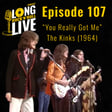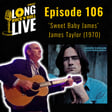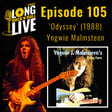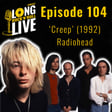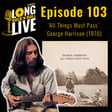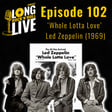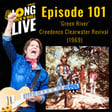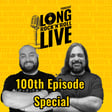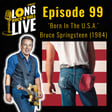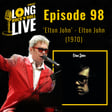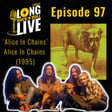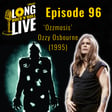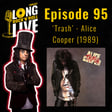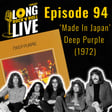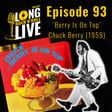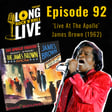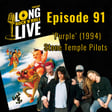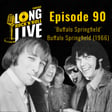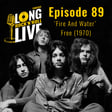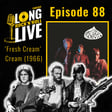Become a Creator today!Start creating today - Share your story with the world!
Start for free
00:00:00
00:00:01

85. 'Close To The Edge' - Yes (1972)
Yes’ ‘Close To The Edge’ was a bold, innovative leap that transformed how rock albums could be constructed - both musically and thematically. Its long compositions, technical prowess and depth of concept pushed the boundaries of rock music and inspired a generation of musicians to explore the more progressive aspects of Rock music. To this day, the album remains a pinnacle of what progressive rock could achieve and continues to be admired for its pioneering vision and legacy.
Episode Playlist: https://open.spotify.com/playlist/6wuEu5aF9oHtXxdOKzTYpO?si=d252445e3b8e4b22
#Prog #ProgRock #CloseToTheEdge #Yes #ProgressiveRock
Transcript
00:00:00
Speaker
Hello and welcome back to the Long Live Rock and Roll Podcast. Yes's Close to the Edge was a bold, innovative leap that transformed how rock albums could be constructed, both musically and thematically. Its long compositions, technical prowess and depth of concept pushed the boundaries of rock music and inspired a generation of musicians to explore the more progressive aspects of rock.
00:00:23
Speaker
To this day, the album remains a pinnacle of what progressive rock could achieve and continues to be admired for its pioneering vision and legacy. Joining me to discuss this album is my co-host, Mr Felipe Amarin. How are you doing, bro? Doing great, man, and you? Yeah, very well. Thank you very well. I'm really excited for this out for this episode, and I'll tell you why.
00:00:43
Speaker
So we did it for for new viewers and listeners, actually quickly terms and conditions. If you're watching on YouTube, make sure you hit like on this video and subscribe to us so you stay up to date with our new content. If you're listening on Apple, Amazon, Spotify, scroll down, give us a review, write a few words about the show if you like it, and it shoots us up the charts and we get to see more people. So it'd be a massive favour to us.
00:01:04
Speaker
Now for new listeners. Thumbs up and click on the bell or whatever that is on the yeah on YouTube. Click on on everything. you know felipo sound and they says shit Now you've said there has to be a bell. I've got to put one there. I don't normally put a bell there. Oh really? So now I've got to do that. Okay. I'll try to put a bell where Felipe said it.
00:01:24
Speaker
Anyway, for new listeners, um we spoke about, yes, I think it was episodef episode 25, so all the way back a good year or so ago. And actually, um the the the result of that episode led to several family members of mine having a go at me for my opinion on Close to the Edge. And I was there. and I don't remember what was this. So this is, I don't remember either. this So I've had family members that I haven't seen for a while and they've gone, oh yeah, I've been listening to the podcast. Yeah, it's really good.
00:01:51
Speaker
Don't agree with your opinion on yes, by the way. And I was like, oh, shit, like what did I say? I don't even remember what I said. I said, do you tell me what I said? la un leash I know. Can you believe it? So I just want to start this. I know we normally start with the album info, which we'll get to. But I want to start by saying Felipe chose this album. Felipe, I get it. I get it. I got it. And I've played Prague before. I've listened to lots of Prague. Court of the Crimson King is one of my favorite albums. A lot of Pink Floyd stuff I love. But this.
00:02:22
Speaker
i'm goodnna i'm good It's like I'm going to insult it before saying I love it. This overly long, wanky, lots of solos, all of this stuff that I didn't get before, I get it now, and we'll get into that in the episode. um So, album info. Close to the Edge by Yes was released on the 8th of September, 1972, recorded between April and June, 1972, which is crazy. It's only a couple of months. At the Add Vision Studios in London, the genre is quite obviously progressive rock.
00:02:49
Speaker
The length of the album is just under 38 minutes. It was released on the Atlantic label and it was produced by the band and Eddie Offord. So um first, we're going to do a little bit of background just to give you guys a little context of what was going on. I'll kick off, I think, Felipe, because I'll do yeah talk about Prague and then you're going to talk a bit about what led Yes to this point.
00:03:09
Speaker
Oh, wait a minute, Prog, like all Prog songs are really long. If you're going to give us ah a brief history of Prog, I'm going to go make a cup of tea and come back. take while yeah I will do my best to be concise. So this is just how we got to Prog.
00:03:25
Speaker
in the early 70s. So in pop music you've got advances in recording technology being utilized by the likes of the Beatles and the Beach Boys and those two bands essentially were proving that pop could be a bit more than just romantic dance music. So they were experimenting you know and the Beatles in the Revolver did the thing where they turned the tape backwards which is a ah unique method.
00:03:47
Speaker
ah Classical music. um A lot of bands are starting to adopt classical compositions, symphonic structures, ambitious concepts. You know, you've got um the moody blues and prokal harem are good examples of doing that. Another side note, guys, any song we mentioned, including the full album, is going to be in a Spotify playlist down in the show notes. So these think the songs and bands I mentioned, they'll be down there so you can hear an example of what we're talking about. As well as this, we had Emerson, Lake and Palmer playing a lot of classical stuff, weren't they? In their early career, they were playing lots of classical covers. yeah ah In terms of jazz and blues, you have a lot more complex time signatures being brought in. you know In the ah early jazz in the 30s and 40s, it was much more straight straight as in simple time signatures. Now you get free jazz where Miles Davis and John Coltrane and all these guys are going off.
00:04:34
Speaker
yeah yeah The early jazz was designed for the dance floor, isn't it? And then it became more experimental. Exactly. So with jazz, you've got the complex time signatures, the improvisational nature of solos. You've got like King Crimson were very jazz influenced, soft machine. And Bill Bruford, who is the drummer of um Yes for this album, was a he he really brought a jazz feeling to this rock album, which I'm sure you'll talk about later.
00:04:57
Speaker
In terms of psychedelic rock, um out of that, which we were talking about the Beatles, came a sort of movement that embraced the idea of concepts and themes. um And then you kind of had bands like Pink Floyd setting an early standard of what this psychedelic rock, the kind of borders on progressive rock was showing. um This out of this world themes, lots of soundscapes, lots of electronic experimentation.
00:05:22
Speaker
So pre-1972 in Prague this is the the general thing of what you've got. King Crimson did in the court the Crimson King 1969. Genesis did nursery crime 71. Emerson, Lake and Palmer did Tarkas 1971 and Genesis did Foxtrot in 1972. So this all preceded where we are and what contextually was happening with Prog before Yes released close to the edge. And that is my concise quick history of Prog before this album. So why don't you give us a little background and context on what Yes we're doing in the lead up to this album.
00:05:57
Speaker
Well, um so I've got to mention two albums that that came immediately before this one. So one was Yea's album, which is the first one with Steve Hall on guitar. ah When he joined the band, that was, I think, the first big change in that sound where the guitar actually um became a more essential part of their sound and they brought a lot of influence of of jazz and folk music into it. So so that was the big the first big big change. And then um after the years album, Tony K left the band, the keyboard player, and they had Rick Wakeman joining them. Rick Wakeman brought a lot of classical music into it, of course, but he was a really experienced session musician. He worked with a lot of big names and
00:06:38
Speaker
And he he knew how to operate in studio. He knew how to get results quickly, which might explain why the album was recorded so quickly, as he said, only a couple of months. ah But also they rehearsed a lot. He was you know ah he was a little bit of a a music director as well, I guess, for the band probably at the time. I can't say that for sure, ah because most of that role was was actually done by John Anderson. But anyway, so when Rick Rickman joined the band, they actually,
00:07:06
Speaker
ah created the yeah the classic lineup of Yes, which only did two albums. There you go. And that classic lineup is John Anderson on vocals, Steve Howe on guitar, Chris Squire on bass, Rick Wakeman on keyboards and Bill Bruford on drums. In 1972, this must have been like, okay, this is just the new up and coming prog rock band. We look back at it now, and you see legend, legend, legend, legend in there in their in their respective instruments.
00:07:33
Speaker
Exactly. Bill Bruford was one of the first musicians to record an album that was considered fusion, which is another genre of music. And Rick Wakeman had a ridiculously successful solo career as well with the most instrumental music and you know all those guys they are yeah like huge names in the music industry now. Virtuosos in their own field. Yeah and they have big names now but at the time they were just like ah kind of getting started with experimentation and all this stuff and I think ah the interesting thing about this is Steve Howe said that this album is part of a trilogy for him
00:08:10
Speaker
which just starts with Yea's album. So you've got Yea's album, you've got Fragile and then you get close to the edge as the final part of the trilogy. It's when they're kind of finding a sound. Is is this trilogy based on the band members?
00:08:25
Speaker
the musical concepts or the lyrical themes? I think it's the music direction they were taking. and okay That's the sound because they were trying to achieve something and in their path to achieve that sound some people quit the band or got sacked from the band because they're like that's where we go. I think I've mentioned this when we did the episode about but yes John Anderson did a really great analogy um about you know did the the constant change of lineup in the band. He said like you get into a bus the bus is going to a certain place, a certain direction, it will stop but every now and then, but it's going and in a certain direction. If you no longer want to go that way, you have one thing to do, you got to get off the bus. And someone else is going to get into the bus and that person is more important. So they were kind of really objective with that, with changing people's like, sorry, you're no longer necessary, you can go.
00:09:19
Speaker
But undoubtedly for this classic lineup, it was the ideas that came from these guys that made this music so good. Exactly. Yeah. So let's let's get into the album. Finally, I just have to say I've really enjoyed it and I'm not one for. I don't go over again if you if you've listened or you've known from before, I don't really love Prague and I ah struggle sometimes to stay interested in the long songs and everything. But what I tell you what hit different today is that The music was just so seamless. Now, one example is I'm going to give you Pink Floyd's Echoes. I love that song and that's probably one of my favorite Pink Floyd songs. However, that five minutes in between where it's just the noises and the same with Dogs by Pink Floyd, actually. I'm OK to check out. I'm OK to just go on my phone a bit, check my messages, whatever.
00:10:15
Speaker
where But do you know what I mean? I'm not saying it's the song worse. I'm just saying, OK, we're going to hear Stone Stone for about seven minutes. So I could just let you go on. That's fine, big boy. Would you carry on? Excuse me, but it's just noise, isn't it? Yeah. Yeah. so But with the but the thing that I didn't understand before that I'm now understanding with bands like Yes, is that there isn't much of those gaps. There's a lot happening throughout the song and just looking at the breakdown of Close to the Edge and the four sections of it.
00:10:44
Speaker
It's just phenomenal because they go seamlessly one into the other and there's no extended three minute gaps of silence or three minute gaps of just one note being held on a keyboard. It's always interesting. And i'll tell you I'll tell you why those parts work well together. There's two things. So I've mentioned Rick Reagan's ability in studio. ah For instance, like he was really concerned about the ah um the organ part on close to the edge, going into a Hammond after, like and and making that sound that transition of sound as smooth as possible as they were recorded in the same place. Anyway, ah but I think the ah the guy who is the ah real,
00:11:23
Speaker
boss in studio was was John Anderson, because he had a clear vision for the album. He wanted to be like a symphony. And when you listen to classical music, the parts can be like considerably different. But there is a glue, there is some sort of a connection between the parts and and and classical composers, they're really careful with ah transitions like how you go from this part into another part you might just go into total silence and then start a new new section that's also fine but I think they will extremely care for this and if you compare to Fragile that's why I believe so if someone think about this we don't we don't we cover a lot of different bands here in the show so we think like when are we going to do Yes Again maybe in another year ah why didn't we do Fragile which is the most popular album right so I would say
00:12:14
Speaker
why I chose this one and I think you would agree with me. Fragile is not necessarily a band album because there's five songs in the album, they're individual pieces written by each of the musicians separately and some of them recorded by just one of them like there's no participation of at any other band but members whatsoever but basically because they just got that lineup together so they had about four songs they actually written and performed together and everything else was just yeah there was probably wasn't a lot of trust Yeah. And it was just like ah ah gathering different pieces of composition and putting them together whilst with Close to the Edge, you actually have an album with a plan. And that's something that I watched a lot of the interviews but with Steve Howell when he goes on about we knew what we were doing. Rick Wakeman also said that we knew exactly what we were doing. I think we had the whole plan in our heads and how to go from A to B every time.
00:13:10
Speaker
Well, let's talk. Let me talk now. You mentioned classical. Let's segue into the classical aspects. Excuse me, guys, I have to forgive me a little bit. Bear with me. So classical elements were brought hugely into this album. And the reason was something I want to touch on is that you mentioned that John Anderson, they want to set, said they want to sound like a symphony. Well, they have actually touched two different types of classical music here.
00:13:37
Speaker
there is a kind of classical music called a symphony which everyone knows you know you have a few Beethoven's first symphony and that's four pieces of music that are linked through maybe keys melodies passages little motifs instrumentation maybe but they're generally all part of one symphony but they're four different songs that make up a symphony we've got this so we've only got three songs and close to the edge but two of them use that so the song close to the edge has four parts solid time of change total mass retain i get up i get down in seasons of man and and you and i also has four parts chord of life eclipse the preacher the teacher and apocalypse now something really clever that these that these salts and not only do they follow symphonic structures in that way
00:14:22
Speaker
They also follow something, which is a it's a musical structure called a sonata form. And for any of you who are not classically trained, sonata form is free, including me, including you. Yeah, that's fine. There's three sections of a piece. So so one of those four pieces in a symphony could be sonata form. Do you know what I mean? It's like a structure within a song. Sonata form is split into three sections. The exposition, which you play in the main key of the song,
00:14:52
Speaker
the development where things get a bit tasty you might go and try some other keys or something and then the recapitulation where you bring it back and use a motif or melody from the first one or the same key but you've had you got your home you go all the way with the development and then you come back to the home afterwards and this is what happens in close to the edge because if you think you know think about the um the chorus, the chorus is in close to the edge, when he sings, Jesus will pass you by. And then you've got that at the first five, six, seven minutes, then you've got a good eight or so minutes of the solos and the keyboard stuff and all the weirdness. And then it comes back at the end for the recapitulation, finding home again. So close to the edge, not only is it a four part symphonic song, it's also written in bloody sonata form. This is
00:15:39
Speaker
songwriting at its absolute best for 70s rock. And isn't the album itself like three parts of a symphony as well kind of? yeah Yeah you could divide in more parts of course but like ah and they actually intended to have one song that would take a whole side of value. I love it. and two songs for the other side. so which is i do the two yeah The last two songs are roughly 10 minutes each and the first song is almost 20 so they actually split the album in terms of length really well and and they I think that's kind of i think they do the the number of songs in the album, the fact that they didn't divide them ah because as I said there's four parts in Close to the Edge but the fact that they did not divide in four tracks
00:16:23
Speaker
it's It's a statement. It's like, you know how far we can go with this? That's what we're gonna do. This song is almost 20 minutes long. that's That's one song, one side of of the LP. I agree completely. I think each piece is just so perfectly crafted and composed. As you said, they knew what they were doing. And you can hear it, man. You can hear there's no... Listen, here's the other thing I wanted to say. Actually, no, I'll say that in my little pre-Philippe's monologue at the end. um Quality, not quantity.
00:16:52
Speaker
Yeah, three some prog stuff. I mean, listen, i don't I'm not slamming anything because I enjoyed the album, but Dream Theater. Do you remember we did Awake? Yeah, that's a pretty long album, long album, lots of songs, lots of themes. And I find less is more sometimes because if sometimes if you try too hard or there's another, you know, oh this is the fifth song in a row with a three minute guitar solo.
00:17:13
Speaker
that's when the more you run the risk of people saying, oh, well, this song doesn't need to be here. yeah They might have put it just put it in because the solo was really good. And that's when I think people start thinking about progress being a bit pretentious. Like, well, actually, this song doesn't match up to the first three. Why have they put, oh, because he's got a really long keyboard solo. Okay, I guess the keyboard is to have his solo. Do you know what I mean? But this, unbelievable. Unbelievable, because the songs are of such different ilk. Let's talk about the songs a bit. Let's talk about Close to the Edge. The intro of Close to the Edge, that craziness.
00:17:52
Speaker
um proper syncopated, it's not pleasant to the ear, it's not agreeable. but um It's just kind of shocking, isn't it? When that guitar starts like, what's going on here? And it's like, it's so busy, but that's the beauty of it. After about like three minutes, I guess, ah they just that all of that craziness stops.
00:18:10
Speaker
all together all at once. And it falls and then you beautifully into like a Pink Floyd sounding thing doesn't it? Yeah but it's kind of it's almost like a funky groove that comes after that. Oh yes you're talking about the part after that. Yeah the for the first kind of verse if you can call it a verse it's probably around three minutes yes.
00:18:26
Speaker
I think funky kind of reggae as well. Yeah, exactly. It's hard to define what that is, isn't it? all there's something of yeah There's something about ah that intro, which is interesting. The influence for that intro, especially the guitar part, was maravichnal orchestra. Oh, that's a big influence of Frank Zappa, yeah. Yeah, the thing is, that's probably the weirdest lineup for a tour ever. Yes, we're touring with the Kinks.
00:18:49
Speaker
right Yeah, what they were supporting the kinks life that makes sense. Imagine when they were ah touring Fragile and then Mahavishnu Orchestra was added to the lineup.
00:19:02
Speaker
And it's like, what the hell is that? Prog band, pop band. Yeah, exactly. But then they saw them playing. The the the story goes that John Anderson and chris and Steve Howard were watching their set and they said, I think we need to go back and into the student practice.
00:19:21
Speaker
wow so you got to be as good as those guys they're good maiovis orchestra were my work my vision orchestra they are they are insanely good so so basically that intro was inspired on their sound you know well there you go yeah What else have we got? I mean, yeah, it's just my notes about the album structure. I just thought it was great. They chose to focus on fewer, more complex music that really helped push the boundaries of audiences understanding the album. And I think this goes back to what you were saying about um not splitting the four songs up. Remember what I said in about the the the precursor to Prague in the 60s?
00:19:55
Speaker
you've got the Beatles who did Rubber Soul which we as we discussed we did an episode on that and that was one of the first pop albums where ah a band like the Beatles said do you know what we're not going to just release a bunch of unrelated singles we're going to release an album of music where each song is connected lyrically thematically whatever And I think, you know, the same goes for here, but in ah in terms of a more sophisticated, longer kind of album, you're asking the audiences, only six years after The Beatles did Rubber Soul, you're saying, listen, here's our version on what an album is, give us a chance, because there's only three songs, they're all 10 minutes long or longer, you know, but it's just brilliant, isn't it?
00:20:33
Speaker
Yeah, it is. And and the thing is, the as I said to you, is is when the ah the five of them managed to put their personalities into the band's sound, I think, and and it's all about that. Shall we talk about the band? Because that's our next section, the technical musicianship. yeah of course um So what we're going to do, if for for listeners and viewers, we're It's hard to sort of pinpoint sections of music in this album because you can't say, oh yeah, let's talk about the verse of Close to the Edge because what is the verse, you know? But if we have anything to say, we're going to do a little time stamp so that you can sort of pinpoint the the thing we're talking about. But for me personally, I'm just going with stuff that I heard over the whole album when we talk about this. So Felipe can do it if he wants. I just want to go through the band now because everyone deserves a little bit of time. and John Anderson, his vocals, so distinctive.
00:21:21
Speaker
so defined it kind of sounds like a hybrid of um what's the guy from the police called the singer uh sting no oh no the other ones yeah no the singer the guitar player then oh sorry yeah no the guitar player and his numbers and he said okay do you know i really messed this one up that is a bad and now i'm on court and video doing it yeah sting is of course the police singer i don't know why i had the guitars in my head But it does sound a bit like Sting, just that kind of light voice reggae. I forget about Sting of all people. like um Can you just forget this ever happened, please? We're not going to edit this out. we'll be aware of We're authentic in our podcast. We're not going to edit this. um John Anderson's vocals, massive range, clarity in the way he speaks. You can understand every lyric. is falseto um his falsetto voice really, I don't know what to say, it kind of conveyed, it really kind of pushed on the audience, the mystic the mysticism, the themes of the album that were a bit like, oh, spiritual, enlightenment. um If you think about the the the verse on Close to the Edge,
00:22:29
Speaker
rhythmically he's very bouncy and a but do at the down a band a turn at that you know i mean it's like he's he this is why i think reggae because when i hear that part you can see me now on the video i'm just bouncing like a reggae song and but but despite all of that that's it despite all of the rhythmic complexities it's still melodic yeah what a performance man Yeah. And under the use of vocal harmonies, because that's the thing. They didn't have one good singer. There's three good singers in the band. Steve Howe and Chris Kwai also collaborate with vocals. And when you hear the the harmonies, especially close to the edge, I think it's just to be, oh, and do and die as well. There's like this bits of of like two different lyrics going on at the same time. And and and the the way they harmonize is just is just amazing. And they always so give some some room ah for the vocals. They always like making instrumentation kind of simpler when there's a lot of harmonies going on so you can actually hear what they're talking about. yeah And it's it's it's beautiful. I think the only band, the only rock band that I that i know well enough to say they have the same sort of, ah um how can I put it, um quality of vocal harmonies is this Queen.
00:23:39
Speaker
He's the only only rock band and maybe the Beatles of course. I'll say Beatles, Queen and Yes. Queen and Yes's harmonies were far more advanced I think. yeah Yes, because the music is is is more complex as well. It kind of follows what the music is.
00:23:54
Speaker
Anything else on John Anderson? ah Well, I think no. I think the fact that he was the there's an interesting thing. He wasn't an instrumentalist like ah as good as the other guys. So he would play the acoustic guitar. Yeah. like he but He would always have the acoustic guitar and to try to show them where he wanted the songs to go. So he was a singer and a music director, in my opinion.
00:24:16
Speaker
And I think that's perfect when you have someone who's there not saying, you know, and I'm not, I'm not um assuming what Steve, Chris, Rick and Bill did, but I can imagine that there's parts like where Rick's like,
00:24:28
Speaker
No, we're playing the A major third chord. We need to drop that leading note down to the seventh. and and And I wonder if John's there just like, guys, can we just go up to this note? You know, not trying to theorize anything or make it theoretical or how it should be. Yeah, he said in interviews he would be like sweating to kind of with the the guitar, trying to to show them some sort of riffle or chord progression but like this. This is where I want the song to go. And they were really ah good at grasping what the other concept was. Yeah, excellent. and um So with Steve Howe, we have a multi-faceted and multi-skilled guitar player who just
00:25:07
Speaker
my god the blend of every bloody style on this album you've got rock obviously you've got jazz sections you've got classical acoustic you've got country playing ah like and and even within guitar styles he plays electric he does acoustic he's got the pedal steel and he even plays a sitar on this album as well just offering so much texture and variety throughout the album ah can can you imagine if all we had was throughout the album was um i'm trying to think of of the recent album we did where we said guitar was just really prominent. It was um Blur where we said that, you know, although they were doing little ah motifs and stuff on the guitar, the main part of the guitar for Blur was just this heavy handed rhythm guitar. Can you imagine if Steve Howe only focused on one or two kind of guitar styles, this album, it would be completely different. There are so many styles. My favorite is so many instruments as well. Yeah, yeah, exactly. um It's just phenomenal.
00:26:03
Speaker
My little, my my favorite part is in um Siberian katru. I mean, let me find the timestamp. Kind of like two minutes in Siberian katru that.
00:26:15
Speaker
And you get it all throughout the song, yeah all through the solo section, through the verse section, through just a little instrumental part, but different itineraries of it. He doesn't have a guitar, then he might do an acoustic, then he does it on the sitar, then he might play the harmony of that slide.
00:26:30
Speaker
it pdosto target It's just a phenomenal way of texturalising one instrument and putting it across the soundboard of the listener.
00:26:41
Speaker
Yeah, he would pick the right guitar for for that specific section of the song, so who alternate. There's moments where he's playing acoustic and playing something that's really ah like kind of a folk vibe and then like Andrew and I has that in the intro and then he moves into a completely psychedelic bit with, ah you know, bass drum and snare drum and and this pedal steel guitar just it sounds more like Pink Floyd if you want, you know that kind which is completely different from the intro, but it just the way he he layers those guitar parts and builds up to the next section is just beautiful. um yeah and there's There's something, if I can make a link between ah him and Bill Bruford, is they they actually
00:27:26
Speaker
refused to be rock musicians, right? okay i Because they they they were not like, um you won't see ah Steve Howe playing a power chord with distortion on guitar. I never did that. It's not his thing. And he he didn't like hard rock. He didn't like that kind of vibe. And Bill Bruford said in in in an interview like ah about the moment he joined us, like, oh, I saw myself as a jazz drummer. That's what I wanted to be. And um that's what I was doing.
00:27:55
Speaker
wow And he was just playing, in his head, he was just playing jazz. So yeah, this these guys are singing at harmonies on top of it or whatever, I'm just playing my jazz beats here. Let's talk about Bill then. Do a bit you want to talk about him a bit? because of Yeah, well as a drummer I have have a lot of things to say about him, but I'll try to keep it ah brief.
00:28:15
Speaker
I think the thing with him is he unlike all the the prog rock drummers at the time he didn't have a gigantic drum kit it's a basic a small cut jazz drum kit not many cymbals not many drums no not at the beginning not other time he recorded it yes and he he he had this amazing way of playing this snare ah mixing marching band stuff with with jazz and displacing the backbeat because what well most of their songs is not like a straightforward 4-4 bar all the way. yeah So you can't just keep a backbeat with the classic 2-4 on this snare drum so you need to move it around but the way he does it no one else could do it. He had this particular sound and he could
00:29:03
Speaker
make the most out of a really really simple small drum kit that anyone can buy in ah in ah in a music shop. There's nothing, obviously good brands of course, but what and'm what what I'm saying is like it's it's ah it's a basic setup for a drummer and he could he was just finding the right sound in the right part of the bar every time. is this another Isn't this another quality over quantity?
00:29:24
Speaker
Yes, and this is more. Yeah, this is more hoof for sure. And there's one thing that I think about him is like, he didn't want to be conventional. He didn't want to do the same thing over and over to the point that immediately after this album, he quit the band. He didn't do the tour. So I joined them and I got to put a word about ah Alan White, who who died a few years ago, a phenomenal drummer, and played everything in his own way. And he joined the band for the tour of the album, having to learn those songs in three days, which is insane. um Yeah, he did his own way. I think he shaped the way the the sound of Yes would be over the years, but Bill Bruford created something that is like, um that would last forever. Yeah, on top of that. so
00:30:10
Speaker
i mean yeah I mean you can hear through the drumming, he definitely favours that jazz style over sort of rock drumming, you've got the complex poly rhythms, syncopated sections, off beat accents, he loved time signatures and what was his, I got in my notes, his favourites, he loved five four and seven eight.
00:30:27
Speaker
which is quite unusual and unconventional for rock music. But it also it depends on who's writing the song. If they come up with those time signatures, can you be creative and at those different time signatures? He could definitely be. one ah ah He quit because I think he believed he achieved the you know everything he could have achieved with that particular band. So, yes, was no longer experimental enough for him. Yeah, there's an argument for that that actually did, yes, ever reach the peaks of close to the edge again. That's maybe for another episode. yeah But not just yeah and my final point about Bill Bruford is not just rock drumming, but a variety of percussion sounds and textures, which we heard about this ELP. Yeah, exactly. He did that as well.
00:31:10
Speaker
Okay, let's, from the drums, should we go to the bass, the rhythm section partner, yeah? Chris Squire, I mean, rest to rest in peace. um What a dude, what a bass player. yeah For me, I've said this before, the if you could ask me to perfectly define bass playing, it would be the perfect balance between the rhythm of the drums and the harmony of the guitar and ah vocals.
00:31:37
Speaker
So for me, the perfect bass line, and I'll add it to the playlist right now, is the Lemon song by Led Zeppelin. Because John Paul Jones just has this fantastic way of playing enough notes that you know what the chord is sounding like, but not playing too much that it becomes a solo or a lead instrument. Just go and listen to that song. That for me is the definition of perfect bass playing. Chris Squire, however, gets incredibly close here for me. You've got everything, bro. Everything. Melodies.
00:32:07
Speaker
um but so roman and it's melodic playing, ah harmonic playing as well. Sometimes he'd play the harmonies, sometimes he'd be a secondary lead instrument in this album. He uses that and the the higher notes, you know, like the that half of but the bass. He stays there for most of the time, maybe the dusty end of his is um is on the lower side. And there are moments where he is counterpointing, and Rick Wakeman does this as well, if Steve Howe is doing a melody, I'm just making this up, but just for example, okay, if Steve Howe's doing... Chris Squire might go... which is called counterpoint, which is moving against each other, but playing the right notes at the certain time. So much of that about, so much of the times where he's playing the harmony of a melody. He plays with the black drum, I think all the time. And fingerstyle, both of them. And then on top of that, you've also got, that's where he fits in with the melody.
00:33:07
Speaker
the counter melodies, the secondary lead instrument, the harmonies. And then you've got him fitting in with the rhythm, where him and Bill Bruford just completely coordinate to give this precise, syncopated flourish of rhythm that just at some moments in the album, you're thinking, my God, like that the technicality needed to play this. But at no point in... Actually, do you know, I think I might blanket this for the whole album.
00:33:33
Speaker
But no point do I really feel anyone is going off on the solo and becoming wanky. I feel like it's all so perfectly crafted. but um It's all intentional. They knew what they were doing. As I said at the beginning, they had a plan. And my final part about Chris Squire was just his tone, which he you get from a famous, it's called a Rickenbacker bass.
00:33:53
Speaker
It's the same bass that Lemmy from Motorhead uses um and that just gives you a really treble heavy tone that when you play it with a pick it sounds thunderous and you can hear it. There is ah there is a distinct identifiable tone in Chris Squire's bass playing and it makes the album just like all of their tones do but yeah yeah just brilliant. On to Rick Wakeman, do you want to start off with him? Yeah I mean probably the best keyboard player in the history of rock music. I would put him side by side of John Lord. Those hill are by my top two. Yeah, seems to be a really, really fun guy to hang out with. I hope I have a chance to do that one. This is the funniest guy. Check his Twitter page. Is there not Twitter anymore? Is it X? yeah whatever
00:34:42
Speaker
ah But yeah, he's ah he's he's really funny. And um is and he's he's got this like approach to music as relaxed as he is as a person. he he He's always aiming for perfection. He's always trying to find the right song.
00:34:58
Speaker
ah one One story that illustrates this his search for the right sound is the fact that he recorded the pipe organ. There's ah an actual pipe organ close to the edge. He recorded at a church. yeah like He got into a church and recorded that thing. And he had that massive echo and he was ah really careful with how that would blend with the rest of of the song. That yeah that is at 12 minutes.
00:35:29
Speaker
That's just after 12 minutes for listeners to check out that that church organ section. Sounds so big, doesn't it? So yeah daunting. And he would bring like really quick um phrases that sound like classical music and play for a couple of bars and just, you know, why we do something else. This is where my research, he had such a deep understanding of classical music and piano and his playing was phenomenal. But what you said is he was a session guy.
00:35:54
Speaker
So he understood the modern needs and desires of songwriters for him to go and put modern keyboard techniques yeah on a modern song, you know, i mean modern for the seventies. So to have that breadth of knowledge, yes starting from classical music over here and everything in between, and then suddenly getting to modern pop and being able to do everything.
00:36:15
Speaker
His signature throughout the album is simply the amount of different sounds we get. You've got melotron, you've got a mini-moog, which for early 70s, a mini-moog was so unique to have. Not many bands had that kind of synth at that time. Church organ, Hammond organ. And these this use of keyboards, it just bought such a, I don't know, in some places it feels orchestral. As we said, you know, the the church organ, the classical sections, there is a baroque solo. So baroque is like a sub genre of classical music.
00:36:45
Speaker
um where they use an instrument called a harpsichord and I've definitely mentioned this before when you hit a piano ah a connector when you hit a piano key a connector goes to the piano and it hits the string like that and that's where you get us to stay note da with a with a harpsichord it pops the note so you press it down it goes like that and that's why it has this diga digga digga digga this sound that is at 3 minutes 15 of Siberian culture that is what that is just a perfect baroque solo this is what you'd expect to hear in a Johann Sebastian Bach composition it's expertly done so you've got that and then all the way you've just got other solos just using a modern keyboard and the breadth of sound and the variety is just amazing
00:37:26
Speaker
um so So that's what I was saying, he bought an orchestral sound in that sense, lots of classical stuff, but then when he started using the synths, you get this futuristic sci-fi progressive sound, just unreal what that could do. Again, just like just like Steve Howe, he could bring different instruments and different textures and make them work together.
00:37:46
Speaker
So smoothly, it's just as just brilliant. one One of the best musicians in rock history, not only keyboard players for sure. Yeah, so all of them are great. that They are at the same level. I think they that's that's what a classic lineup is, isn't it? When you find the perfect like four or five musicians who can really deliver what the band is looking for.
00:38:07
Speaker
yeah Let's talk quickly then about the conceptual depth of the album. I mean, did you look a lot into the lyrics? and you know I did look into them. I i got i got lost trying to trying to find the meanings of some stuff. Some people would claim there's too hippy, right? But put it into context. That was the 70s. Everyone was a bit hippy, wasn't it? I think so. Everyone a little bit in the hippy chart.
00:38:30
Speaker
Yeah, this one there's one thing ah that i um i just I don't want to misquote, so I'm going to get the right phrase. There's one thing um that is interesting, which kind of summarizes the whole the whole lyrical content of the album. its ah Steve Howe had it had this line from a song from his previous band that was something, it was close to the edge down by the river.
00:38:55
Speaker
And then he was literally talking about the Thames River because he lived close to the river. right And then ah he showed those lyrics to John Anderson. John Anderson was like, whoa, wait a minute. This is about the spirit. This is about humans, you know, finding a path. And he went like he put a new depth to it. And he said, that's what he said, John Anderson. The river leads you to the ocean. All paths lead you to the divine. Human beings are close to the edge of realization.
00:39:24
Speaker
So that is what it is. So it's a spiritual journey of looking for the divine and you're never there but you're close, you're really close. and So that tension of being close to the edge but never actually finding the meaning of things. I think there's a lot of it and I think he is good, ah really good at writing that kind of stuff.
00:39:46
Speaker
The lyrics are great. There's so many metaphors. There's lots of imagery. It feels quite surreal. You know, you really just want to put your head back close to the eyes and listen to the words. I mean, Rick Wakeman also said, yeah yeah. He was inspired by Herman Hesse's Siddhartha and a lot of Eastern spirituality as well. Yeah. And Rick Wakeman said that in different ways, they were all, the five of them in in a certain spiritual path, they were looking for something. So it's not, it's not random. It's not, and it's not one guy's view. It's what the band was feeling at the moment. my God, this is just such a cohesive album, isn't it? Just everything links between the five of them. It's phenomenal. It's the mind, the soul and the body. When you think about how to execute a phrase in an instrument, you've got to have the technical proficiency. So you got your body needs to be able to to do that. And then you have the master plan behind the album as a concept. That's your mind. yeah And you have your soul into the lyrics, which is the ah the spiritual concept of the album. So it's literally man really well balanced. Lovely. and beautifully
00:40:43
Speaker
um Cool, and there's a little bit of innovation in this album with the production techniques. I mean, you know, I think we find actually there's a consistent theme that most of those famous albums have something technological that did something better. um With this one, you've got them, they experimented with with very complex layers because as you said in the harmonies, there's so many voices stacked up, even guitars in Siberian Catra.
00:41:05
Speaker
So this is one section, I swear you can have like four or five of them and you're gonna need this complex layering. ah Editing techniques they use for pretty ahead of their time. Even things like the intro of Close to the Edge, just the birds and those nature sounds. So you know what that is? they yeah that's that's That's a keyboard.
00:41:19
Speaker
but they just, yeah, they just they saw to speed up the tapes and loop them. I thought they actually recorded bird sounds. and That's why yeah ah but they did it. That's a keyboard raise and they speed it up ah and and i made a loop out of it. And that's how the bird sounds come. Yeah. So it's all studio experimentation. I think, ah yeah, I think, I don't know if it was Rick Wakeman who said that they were, they've produced something that was beyond what technology could deliver at the time. And they never did that ever again.
00:41:49
Speaker
It sounds phenomenal. It sounds like a raw, I say raw, as in you think about how a prog album might sound these days, lots of production, lots of polish. It's raw in that sense, as in you can hear every instrument being played by the musician, but still the layers and the complexity behind it is really, really massive. Massive well done to Eddie Offord and the band for producing it. Cool. Yeah. Onto the last part, legacy and the influence of this album. Onto the last part, yeah. I mean, it's one of those albums, as I mentioned,
00:42:18
Speaker
from the late 60s where Progrock started to become a thing to the mid 70s where it had definition. This is what Progrock is and it was one of those key albums in saying to the world this is a definitive version of what Progrock is and but more than that It went further in terms of making songs ridiculously long, splitting them into four parts, making them classical based in terms of their structures. So not only did it put a definition of this is what prog rock is to us, it inspired others after Genesis started writing longer songs after that album came out. It just moved all of them together and moved the genre of prog rock.
00:42:57
Speaker
forward to such an extent I don't think even yes we're able to comprehend what they've done and achieved with this album yeah they all said in different interviews they're still amazed by by the album 50 years later which is impressive it's still it's amazing because you're showcasing rock music it's rock music but it's intellectually stimulating it's sophisticated it's got concepts and deep thematic themes about enlightenment um And you got the the the whole, like, ah I think, close to the edges, a long piece with all the information about the album. It pretty much is all in there. And then you have like a beautiful, mostly acoustic piece, which is Andu and I. And you end up with the proper rock song, I would say. You know, Siberian Kathru has a rock riff at the beginning. is it's It's as close to hard rock as as ah Steve Howe would ever get. So I was going to say that for me, it's just to sum up the album,
00:43:51
Speaker
You've got two incredibly progressive and well crafted and thought about songs that required a lot of care, attention to detail, et cetera, et cetera. And then at the end with Siberian Catra, it is all those things, but it's just a celebration. It sounds like they're having fun when they're doing Siberian stuff is good, but they've got to be careful. You've got to be precise with the keyboard.
00:44:13
Speaker
siberian capture it's like let's just have a jam and a funky hard rock jam. And that song was the transition into the next lineup, because Alan White was in the studio with them, like, you know, hanging out with them during some of the rehearsals and recordings. And he jammed with them. He played the Siberian category on drums with them. So that was when he first actually played with with what would be his band for decades.
00:44:35
Speaker
yeah And then the final part, how about legacy and influence, is that this album just showed to the world that there was an audience for this music, which is what I just said um in the terms of you know making extra long songs, paving the way for future albums, for Genesis to do their thing, for ELP to come and crack on with their thing, for crimp and King Crimson. Dream Theater. a big fall of yes that's ah i have near The Metal, man, I all love them. Symphonic Rock, Art Rock, Prog Metal, all of these things have stemmed from albums like this that really showed you could push the boundaries on album. I really enjoyed it, man, and you know my thoughts on Prog. I'm not normally like a massive lover. Shall I do my little, I've got a couple of sentences before Felipe's got his monologue.
00:45:21
Speaker
so um there that There's been a massive newfound appreciation and respect I now have for Prague. Again, I've always respected it, but in terms of enjoying it, today has been a new day for me. I normally subscribe to the the the form of multiple songs on an album, and I tell you why. It's because I listen to an album.
00:45:39
Speaker
And if there's 10 songs on the album and I don't like three of them, then I'm like, okay, 70% of the album, I still enjoy and I can still like and and, you know. But when you've got only three songs on the album and they're all over 10 minutes long, it's harder to sort of make that percentage. Because if you don't like two of the songs, you're like, okay, well, this album is probably not for me. I don't even like half of it. But um I think what I what understood this time was that you can't that there might be in that 18 minute close to the edge, there might be a minute here, 30 seconds there, four minutes there that I think, you know, what it it's not entirely for me. I don't really like that riff. that That part doesn't work for me. But I think about the effort, the talent and the craft that it takes to execute a cohesive 18 minute progressive rock masterpiece. I don't ever see myself just putting it on in the car or choosing it to listen to on a random day.
00:46:34
Speaker
It most definitely feels like an experience that you need to have with some headphones on a dark room. But it's safe to say, however you consume it, it's a fantastic album and then and a staple in the central prog rock listening. So thank you for um for suggesting this, bro, because I had a great time with it. Really, I've listened to it about six or seven times. Brilliant. Amazing. There's a story about Rick Wakeman listening to this in his car. And he was on a highway somewhere open.
00:47:01
Speaker
or motorway and he stopped. He had to stop. and That was like 50 years after he stopped ah and parked his car and started listening to it. And it was like, how the fuck did we do that?
00:47:17
Speaker
He was amazed by his own work. ah One quote before my monologue, sure Roger Dean, the guy who designed the the artwork for the album, you've got some of it in your background. And he designed the logo, which became, yes, official logo from that moment on, that which is the one, yeah, that the first album that had that logo was ah close to the edge. the The album cover is just green. There's nothing to it, pretty much nothing to it.
00:47:44
Speaker
And then when you open the the vinyl the or or even the CD sleeve, you have these amazing landscapes. ah What he said about his art for the album, I think really relates to the music. He said, I wanted to take people to places they can't go any other way. Wow. I don't think those landscapes are not real. I don't think a sentence I don't think a sentence so short has so perfectly summed up an album. It's just just that. yeah That's the only way to go to those places. I want to give people to take people to places that they've never been before. Yeah. and They can't go any other way. So um so can I do my time for Felipe's monologue? And we've decided now, we thought, well, why the hell is it just Laz doing monologue? Even if Felipe chooses an album, you've chosen it for a reason. So you should do it.
00:48:34
Speaker
So we're now doing it there. Felipe chooses the album. Felipe is doing the monologue. If I choose the album I might do the monologue. So but which I can't wait because your monologue last week was amazing. um Thank you very much sir. I really appreciate your kind words. Go ahead bro, crack on. So I normally say all the time, i say forgive my French because I swear a lot. I'll just say forgive my English but here we go. um With two new members in the band, Yez has found its classic lineup and produced a masterpiece, Fragile. They have proved to music fans all over the world that they have the musicianship necessary to push the boundaries of prog rock, but the best was yet to come. With close to the edge, they were capable of acting more like a group than a bunch of high skilled musicians. The solos became more complex, the grooves became more ambitious, the vocal harmonies can impress any music lover.
00:49:27
Speaker
Despite all the incredibly well-crafted instrumental and vocal parts, this album is more than anything a spiritual journey into the depths of the human soul. A collaboration between five great artists who decided there was still some extra ground to be explored with their talent. Yes, has definitely brought us but is all closer to the edge and made the world rethink what a rock music or what rock music can achieve. Amazing.
00:49:56
Speaker
Perfect, very perfectly summarized. Cool. So are we done? Yeah. Are you guys done? Close it to the edge. I hope so. This album is great. and yeah Thank you guys. Thank you for joining us for another episode of the Long Live Rock and Roll Podcast. We hope you come back. If you're watching us on YouTube, make sure to hit like and subscribe to stay up to date with new videos. We've got episodes coming out every week, which will be a new album, a new band, or a new discussion point. If you're listening on Apple's Spotify or Amazon, make sure you follow us on those platforms, but do us a favor. It takes 20 seconds of your time. scroll down, give us five stars, write a nice little sentence about us, it's just going to make the world a difference because we'll shoot up the charts, we'll be seen by more people like you guys because we do this all off our own backs, we're an independent podcast and we do it because, as I hope you can see and hear, we love music. and We love rock and roll and we love rock music.
00:50:45
Speaker
So yeah, we're going to keep doing this for a long time. Email us with suggestions, let us know your thoughts on the episodes, and thank you for joining us. Yeah, thanks for everyone for being with us one more time. You know, if you haven't listened to this album yet, or if you haven't long ago, give it another spin, enjoy it, it's a great album. stop Stop on the motorway when you're doing 70 miles an hour, park the car, and listen and just think, how the hell did these guys do this?
00:51:10
Speaker
bloody amazing right yeah keep on rocking everyone and don't do anything i wouldn't do and as usual guys take care and long live rock and roll
